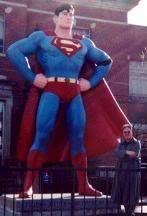| Pop Culture Gadabout | ||
|
Wednesday, July 25, 2007 ( 7/25/2007 07:53:00 AM ) Bill S.  "THERE BUT FOR FORTUNE, GO YOU OR I" – For a singer who was primarily known in the Vanguard Era as an anti-war rabble-rouser (earning, for example, the satirical derision of curmudgeonly cartoonist Al Capp, who once did a "Li'l Abner" caricature of her as "Joanie Phonie"), the recorded output of Joan Baez was surprisingly gentile. It wasn't until her fifth long-player that anything approaching a topical protest song appeared. And even then one of these two tracks, Richard Farina's "Birmingham Sunday," could've been mistaken as a more traditional piece by those not focusing on the lyrics since Farina had layered his scathing indictment of a racially motivated church bombing over an old English ballad entitled "The False Bride." Listening to the new ten-track Vanguard Visionaries collection, featuring material from the singer's first decade, you can't help registering just how sweet this once so-controversial folkie could sound. "THERE BUT FOR FORTUNE, GO YOU OR I" – For a singer who was primarily known in the Vanguard Era as an anti-war rabble-rouser (earning, for example, the satirical derision of curmudgeonly cartoonist Al Capp, who once did a "Li'l Abner" caricature of her as "Joanie Phonie"), the recorded output of Joan Baez was surprisingly gentile. It wasn't until her fifth long-player that anything approaching a topical protest song appeared. And even then one of these two tracks, Richard Farina's "Birmingham Sunday," could've been mistaken as a more traditional piece by those not focusing on the lyrics since Farina had layered his scathing indictment of a racially motivated church bombing over an old English ballad entitled "The False Bride." Listening to the new ten-track Vanguard Visionaries collection, featuring material from the singer's first decade, you can't help registering just how sweet this once so-controversial folkie could sound.The set opens with some of Baez's earliest recordings: first album opener "Silver Dagger," moody Child Ballad "Mary Hamilton" and Phil Ochs' "There But for Fortune," the second topical cut from that fifth elpee. All three songs feature the spare sound favored by folk performers in the early sixties – just the singer's pure soprano and her acoustic guitar – and their forthright sincerity works to the songs' benefit. (Ochs' "Fortune," a wistful contemplation of the less fortunate that's long on empathy if short on analysis, has never been better covered.) It isn't until the fourth track, the traditional sailor's ballad "Jackaroe" (a.k.a. "Jack Monroe"), that more instrumentation starts to show up, though Baez's pristine soprano is always the prime focus – as well it should be. Two major shifts in the singer's repertoire get captured in the second half of this short set: first, Baez's volatile relationship with sixties contemporary Bob Dylan is reflected in her growing use of the singer/songwriter's catalog, while her marriage to anti-war activist David Harris brought her into singing country-and-western in a Nashville studio style. Earlier recordings of country classics, like her version of Lefty Frizzell's "Long Black Veil" (also memorably covered by Johnny Cash) included here, had been performed in a folk style; with the release in the latter half of the sixties of works like David's Album, Baez embraced the fuller sound of the Nashville sessioneers. It's with her performances of Dylan's "Love Is Just A Four-Letter Word" and Gram Parsons' "Hickory Wind" that you can hear both forces at play. To my ears, Baez's version of the Parsons song is the superior track – at times, in "Word," the singer pushes a bit too hard to make Dylan's prolix lyrics work – but they both shine as examples of the way that folk artists of the sixties grew to accommodate more mainstream studio sounds without fatally compromising the singer's sincerity. In "Word," we get snatches of Eastern sounds and steel pedal tossed into the blender, and none of it sounds out of line. Either of those two elements would've been unthinkable when Joan was releasing her first Vanguard platter. Back when Al Capp was making "Joanie Phonie" a villainess in his comic strip, the two famously posed for a cover of Time with the singer posing mid-song and the cartoonist mugging displeasure with two fingers in his ears. It was a canny move on both entertainers' part, though, in retrospect, I think Baez comes off better for the experience. Unless you're the sort of aesthetically cobbled soul who believes a person's political orientation is the sole gauge of their artistic worth, Capp's pose works more as a measure of his inability to appreciate the earnest and immaculate voice in the picture than as a biting commentary on her political stances. (Googling the name for this review, I was unsurprised to see that present-day conservabloggers were still pulling out Capp's none-too-clever name when they wanna rail against Baez's current political statements.) Fortunately for the rest of us, collections like this exist to demonstrate just how tone-deaf so many of her critics could be . . . # | |
|
|

